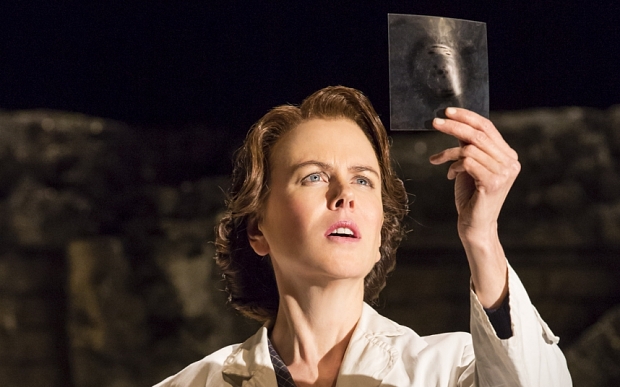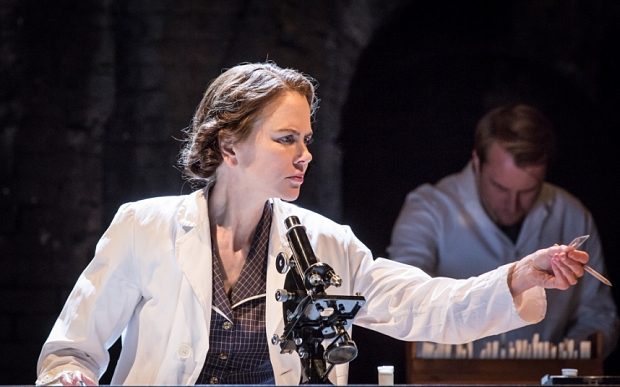Stage Door is taking a little trip across the Atlantic, since David is lucky enough to live in London, where TFE deity Nicole Kidman is currently treading the boards in Photograph 51.

Every article announcing Nicole Kidman’s return to the London stage made reference to the infamous review labeling her “pure theatrical Viagra” when she first played in the West End in 1998’s The Blue Room. Seventeen years on, the subject of Photograph 51 could hardly seem more antithetical: Rosalind Franklin’s passion in life is her work, the groundbreaking research into the structure of DNA, her part in which has been forgotten by mainstream history, partially due to her premature death from ovarian cancer before her male peers were awarded the Nobel Prize for their work.
Kidman’s choice of this modern, largely unknown play for her theatrical return was a very conscious one. Director Michael Grandage (who also directed her in upcoming film Genius) revealed that Kidman “said she wanted to play in something that was new and which had a powerful female character in it.”
It’s hearteningly typical of Kidman’s career for her to pursue something in that manner, and even more heartening that playwright Anna Ziegler doesn’t make that the entire drive of the narrative. The constancy of the sexist injustices of Franklin’s career is built into the structure and staging of the play: the five men who make up the rest of the cast often break into narration, discussing Doctor Franklin even as Kidman lingers in the shadows behind, and take up residence in the brick arches at the back of the stage when their characters are inactive, a constant masculine presence in a world where Kidman’s Franklin is, for the audience, the sole woman.

Franklin is a character ideally suited to Kidman’s star image: her frosty demeanour is subtly coloured by self-protective impulses, whether against her own loneliness and insecurity or a reaction to the ingrained sexism of how men treat her. (Plus it’s a chance to show off how she’s refined that English accent since Virginia Woolf.) When Franklin makes a scientific breakthrough – most notably the revelations of helical structure found within the eponymous photograph – Kidman’s star wattage really lights up, ably assisting Ziegler’s words in what might be their most momentous achievement: making scientific discovery legible through art as a subject that is not only involving, but positively inspiring. As she stares up at the translucent photograph, Kidman is positioned out to the audience, yet the moment feels so intimate, the actress’ eyes trained so precisely to demonstrate the private triumph of the discovery.
Photograph 51’s main propulsive force is this thrill of discovery, and Ziegler’s script is just as good at exploring how the many men of the scientific community are driven by the same passion, and how difficult they find it to accept that a woman could ever equal their achievements. We understand how the pressure to resist repressive masculinity plagued Franklin, and how this may have led her to deny further scientific breakthroughs and much of her emotional life in the process. Given levity by Kidman’s dry line readings and the self-deprecating interjections of research assistant Ray Gosling (Joshua Silver), Photograph 51 is compelling, pensive and almost too brief, but this kind of emotional brevity would likely be exactly the sort of play Franklin herself might have approved of.
Photograph 51 plays in London's Noël Coward Theatre until 21 November.